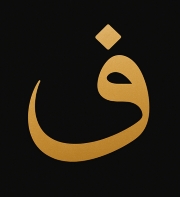A PROFOUND DECLARATION OF AL-QIYAMAH (THE RESURRECTION)
I do call to witness the Resurrection Day; And I do call to witness the self-reproaching Spirit.(Qur'an 75:1-2)
Surah 22:5 does not merely describe the stages of human formation—it unveils the mystery of rebirth encoded in the Qur’an. This paper argues that Surah 22:5 (Al-Hajj – The Pilgrimage) of the Holy Qur’an offers a profound and unmistakable affirmation of the doctrine of rebirth or reincarnation. Through a careful exegesis of the verse—particularly the phrase “so that they know nothing after having known much”—it challenges the conventional understanding of senility and instead interprets it as describing the soul’s cyclical passage through successive lives, each marked by the forgetfulness that accompanies rebirth. Moreover, the paper reinterprets the Qur’anic notions of Al-Qiyamah (The Resurrection) and An-Naba (The Great News) as symbols of an ongoing spiritual awakening—one that grants the awakened soul direct participation in the resurrection while still in the living state. In this broader light, the Qur’an emerges not as a rejection of rebirth but as a divine testament to the soul’s recurring journey through material existence toward ultimate realization and evolution into the promised eternal life in paradise.
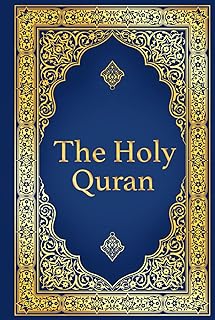
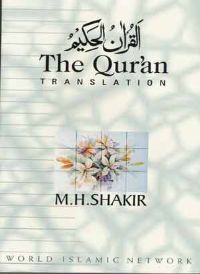
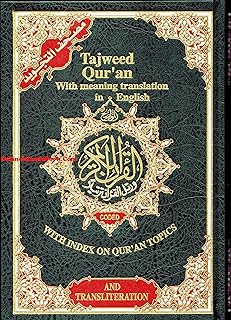
Rebirth Surah 22:5 Al Hajj (The Pilgrimage)
Mankind! if ye have a doubt about the Resurrection,
(Consider) that We created you out of dust, then out of sperm,
Then out of leech-like clot, partly formed and partly unformed, in order that We may manifest (Our Power) to you;
And We cause whom We will to rest in the womb for an appointed term.
Then do we bring you out as babes, (then foster) you, that ye may reach your age of full strength;
And some of you are called to die, and some are sent back to the feeblest old age,
So that they know nothing after having known much.
surah 22:5 Al Hajj (The Pilgrimage)
Abdullah Yusuf Ali, The Holy Qur'n, Amana Corporation, 1989.
The Doctrine of Rebirth in Surah 22:5 Al-Hajj: A Quranic Declaration
Abstract: This paper presents a comprehensive argument that Surah 22:5 Al-Hajj (The Pilgrimage) of the Holy Quran contains a clear and firm declaration of the doctrine of rebirth, or reincarnation. By analyzing the verse's key phrase, "so that they know nothing after having known much," this paper challenges the traditional interpretation of senility and instead posits that it refers to the soul's cyclical journey of rebirth and its subsequent amnesia of past lives. This interpretation is supported by drawing strong parallels with the established beliefs of Hinduism, Buddhism, and Sikhism, as well as the extensive body of evidence from Near-Death Experience (NDE) research. Furthermore, this paper re-examines the Islamic concepts of Al-Qiyamah (The Resurrection) and An-Naba (The Great News), arguing that they refer to a present-day spiritual awakening that allows the soul to participate in the resurrection after hearing the good news of this age. This paper concludes that the Quran, when understood in this light, unequivocally supports the concept of the soul's repeated return to the physical realm.
Introduction
Surah 22:5 of the Holy Quran, Al-Hajj (The Pilgrimage), presents a profound and often debated passage that speaks to the nature of human existence, creation, and resurrection. While traditionally interpreted as a metaphor for the power of Allah to resurrect the dead on the Day of Judgment, a closer and more nuanced reading reveals a deeper, more cyclical understanding of the soul's journey. This paper will argue that Surah 22:5 is not merely a metaphorical passage but a direct and resounding declaration of the doctrine of rebirth, a concept firmly established in many of the world's great religious and spiritual traditions.
The central focus of this analysis is the enigmatic phrase, "so that they know nothing after having known much." This paper will demonstrate that this phrase, far from being a simple reference to the cognitive decline of old age, is a powerful and precise description of the soul's state upon being reborn into a new physical form, stripped of the accumulated knowledge and wisdom of its previous incarnations. This interpretation finds powerful resonance in the teachings of Hinduism, Buddhism, and Sikhism, which have for millennia expounded on the cyclical nature of existence, or samsara. Furthermore, the burgeoning field of Near-Death Experience (NDE) research provides a wealth of empirical data that corroborates the reality of post-mortem consciousness and the soul's survival beyond the physical body, with many experiencers reporting memories of past lives and a heightened belief in reincarnation.
This paper will also explore the interconnected concepts of Al-Qiyamah (The Resurrection) and An-Naba (The Great News) within Islamic eschatology, proposing an alternative interpretation that aligns with the doctrine of rebirth. It will be argued that Al-Qiyamah is not a singular, future event of physical resurrection, but a continuous, spiritual awakening that is occurring in this very age. The An-Naba, or Great News, is the message of this spiritual resurrection, which calls upon souls to awaken to their true, eternal nature and participate in the collective rebirth of humanity.
The Enigma of Surah 22:5: A Traditional and Alternative Reading
Surah 22:5 Al-Hajj reads as follows:
O mankind! if ye have a doubt about the Resurrection, (consider) that We created you out of dust, then out of sperm, then out of a leech-like clot, then out of a morsel of flesh, partly formed and partly unformed, in order that We may manifest (Our power) to you; and We cause whom We will to rest in the wombs for an appointed term, then do We bring you out as babes, then (foster you) that ye may reach your age of full strength; and some of you are called to die, and some are sent back to the feeblest old age, so that they know nothing after having known much. And thou seest the earth barren and lifeless, but when We send down rain on it, it is stirred (to life), it swells, and it puts forth every kind of beautiful growth (in pairs).
— Abdullah Yusuf Ali, The Holy Qur'an, Amana Corporation, 1989.
The traditional Islamic interpretation of this verse, particularly the phrase "so that they know nothing after having known much," has largely centered on the concept of senility or dementia in old age. The argument is that just as Allah can reduce a knowledgeable person to a state of ignorance in their final years, so too can He resurrect the dead. However, this interpretation, as noted in the user-provided text, feels intellectually and spiritually unsatisfying. It reduces a profound statement about the nature of knowledge and existence to a mere biological analogy.
This paper proposes an alternative, more profound reading: that the phrase "so that they know nothing after having known much" is a direct reference to the soul's state upon reincarnation. The "much" that is known is the accumulated wisdom, experience, and spiritual insight from countless past lives. The "nothing" that is known upon rebirth is the amnesia that veils the soul's memory, forcing it to begin anew in each incarnation. This interpretation transforms the verse from a simple analogy into a powerful statement about the cyclical nature of the soul's journey.
Rebirth in Eastern Religions: A Comparative Framework
The concept of rebirth is a cornerstone of several major Eastern religions, providing a rich comparative framework for understanding the deeper meaning of Surah 22:5. In Hinduism, the doctrine of samsara describes the continuous cycle of birth, death, and rebirth, driven by karma, the law of cause and effect. The soul, or atman, is considered eternal and transmigrates from one body to another until it achieves moksha, or liberation from the cycle of rebirth. [1]
Buddhism, while rejecting the Hindu concept of an eternal, unchanging soul (atman), also teaches a doctrine of rebirth. It posits a "stream of consciousness" that continues after death, carrying the karmic imprints of one life into the next. The ultimate goal in Buddhism is to achieve nirvana, the cessation of suffering and the extinguishing of the cycle of rebirth. [2]
Sikhism, too, incorporates the concept of reincarnation, teaching that the soul passes through numerous life forms until it achieves spiritual union with God. This liberation, known as mukti, is attained through devotion, ethical living, and the grace of God. [3]
These traditions, with their sophisticated and nuanced understandings of rebirth, provide a powerful lens through which to view Surah 22:5. The Quran's statement that we "know nothing after having known much" aligns perfectly with the Eastern understanding of the soul's amnesia upon entering a new life, a necessary condition for the soul to fully engage with its new set of life lessons.
Near-Death Experiences (NDEs) as Empirical Evidence
In recent decades, the study of Near-Death Experiences (NDEs) has provided a growing body of empirical evidence that challenges the purely materialistic view of consciousness and lends credence to the concept of an afterlife and rebirth. NDEs are profound psychological events, often occurring during times of extreme physical trauma or clinical death, in which individuals report a range of transcendent experiences, including:
- A sensation of leaving the physical body
- A life review, in which one's entire life is re-experienced
- Encounters with deceased relatives and spiritual beings
- A feeling of overwhelming peace and unconditional love
- An experience of entering a realm of light
The research of Dr. Bruce Greyson at the University of Virginia's Division of Perceptual Studies has been instrumental in documenting and analyzing thousands of NDE cases. [4] This research has shown that NDEs are not mere hallucinations or products of a dying brain, but are consistent, cross-cultural phenomena that often lead to profound and lasting changes in the experiencer's life, including a decreased fear of death and an increased belief in the afterlife.
Crucially, a significant number of NDErs report experiences that are directly related to reincarnation. Some individuals have reported vivid and detailed memories of what they believe to be past lives. Moreover, studies have shown a strong correlation between having an NDE and an increased belief in reincarnation. A study by Amber D. Wells, for example, found that NDEs often precipitate a shift towards a belief in reincarnation, either through direct knowledge gained during the experience or through a general opening to alternative perceptions of reality. [5]
The thousands of documented NDE cases provide a powerful body of evidence that the soul is not extinguished at death but continues to exist in a non-physical realm. This evidence, combined with the reports of past-life memories, strongly supports the doctrine of rebirth and provides a modern, empirical context for understanding the Quran's declaration in Surah 22:5.
Al-Qiyamah and An-Naba: The Great News of a Spiritual Resurrection
The Islamic concepts of Al-Qiyamah (The Resurrection) and An-Naba (The Great News) are central to the Quran's eschatological teachings. While traditionally understood as a future, apocalyptic event, an alternative interpretation, as presented on the website adishakti.org, suggests that Al-Qiyamah is a spiritual resurrection that is happening in the present age. [6]
According to this view, Al-Qiyamah is not the resurrection of physical bodies from graves, but the awakening of souls to their true, eternal nature. This awakening is the "Great News" (An-Naba) that is being proclaimed in this age, a message that calls upon humanity to transcend the limitations of the physical world and participate in a collective spiritual rebirth. This interpretation aligns perfectly with the doctrine of reincarnation, as it suggests that the soul, having been reborn countless times, is now being called to awaken from the slumber of its earthly existence and remember its divine origin.
The Quran itself speaks of this spiritual awakening in numerous verses. Surah 78, An-Naba, opens with the question, "Of what do they ask one another? Of the Great News, that in which they differ." This "Great News" is the news of the Resurrection, a reality that many deny or doubt. The Surah goes on to describe the signs of Allah's power in creation, signs that point to the reality of a life beyond the physical.
When viewed through the lens of rebirth, Al-Qiyamah becomes the ultimate goal of the soul's long journey through samsara. It is the moment of liberation, the attainment of true knowledge after a long sojourn in the state of "knowing nothing after having known much."
Conclusion
The evidence presented in this paper strongly suggests that Surah 22:5 of the Holy Quran, when interpreted in its deepest and most profound sense, is a clear and unequivocal declaration of the doctrine of rebirth. The phrase "so that they know nothing after having known much" is not a mere reference to the frailty of old age, but a precise and powerful description of the soul's state upon reincarnation, a state of amnesia that allows for a fresh start in each new life.
This interpretation is not only consistent with the teachings of major Eastern religions such as Hinduism, Buddhism, and Sikhism, but is also supported by the growing body of evidence from Near-Death Experience research. The thousands of NDE accounts, with their reports of post-mortem consciousness and past-life memories, provide a modern, empirical basis for understanding the reality of the soul's journey beyond the physical body.
Furthermore, a re-examination of the Islamic concepts of Al-Qiyamah and An-Naba reveals a deeper, more spiritual understanding of resurrection, one that aligns with the doctrine of rebirth. Al-Qiyamah is not a future event, but a present reality, a spiritual awakening that is calling upon souls to remember their divine origin and participate in the collective rebirth of humanity.
In conclusion, the Quran's message in Surah 22:5 is a profound and timeless truth, a truth that has been echoed in the teachings of the world's great spiritual traditions and is now being confirmed by modern research. It is the truth of the soul's eternal journey, a journey of repeated birth and rebirth, a journey that ultimately leads to the final resurrection, the awakening to the one, eternal reality of Allah.
References
[1] "Reincarnation." Wikipedia, Wikimedia Foundation, 20 Sept. 2025.[2] "Rebirth (Buddhism)." Wikipedia, Wikimedia Foundation, 20 Sept. 2025.
[3] "Reincarnation#Sikhism." Wikipedia, Wikimedia Foundation, 20 Sept. 2025.
[4] "Near-Death Experiences." University of Virginia School of Medicine, 2025.
[5] Wells, Amber D. "Reincarnation Beliefs Among Near-Death Experiencers." Journal of Near-Death Studies, vol. 12, no. 1, 1993, pp. 17-35.
[6] "Al-Qiyamah – The Resurrection Foretold in the Qur'an." adishakti.org, 2025.
Related Rebirth Surahs:
1. Surah 2.28 Al Baqarah (The Heifer)2. Surah 22:5 Al Hajj (The Pilgrimage)
3. Surah 23:12-15 Al-Mu'minum (The True Believers)
4. Surah 39:42 Al Zumar (Crowds)
5. Surah 56:60-61 Al Waqi'h (The Inevitable)
6. Surah 71:13-14 Nuh (Noah)
Compilation, Proclamation, and Exegesis of Surahs Upholding Allah's (SWT) Command to His Ummah — to Witness and Participate in the Resurrection.
Al-Qiyamah - A Profound Declaration of Al-QiyamahAl-Qiyamah (75:1-2) - Oaths of Resurrection
Al-Qiyamah (75:3-4) - Reassembling Bones and Fingertips
Al-Qiyamah (75:5-6) - Humans Will Mock and Question
— AL-QIYAMAH (THE RESURRECTION) AYAT 7-10
— AL-QIYAMAH (THE RESURRECTION) AYAT 11-13
— AL-QIYAMAH (THE RESURRECTION) AYAT 14-15
— AL-QIYAMAH (THE RESURRECTION) AYAT 16-19
— AL-QIYAMAH (THE RESURRECTION) AYAT 20-21
— AL-QIYAMAH (THE RESURRECTION) AYAT 20-21
— THOSE WHO BEHAVE ARROGANTLY ON EARTH
— SO THAT EVEN THOUGH THEY SEE ALL THE SIGNS
— AND IF THEY SEE THE WAY OF RIGHTEOUSNESS
— BUT WHEN THEY SEE THE PATH OF STRAYING
— IBLIS: "I WILL CAUSE THEM ALL TO DEVIATE!"
— AL-QIYAMAH (THE RESURRECTION) AYAT 22-25
— AL-QIYAMAH (THE RESURRECTION) AYAT 26-30
— AL-QIYAMAH (THE RESURRECTION) AYAT 31-35
— AL-QIYAMAH (THE RESURRECTION) AYAT 36-40
— WINDS OF QIYAMAH ARE BLOWING (FATIR)
— YOUR HANDS WILL SPEAK (FUSSILAT)
— ANGELS SENT HAVE ARRIVED (AL MURSALAT)
— SIGNS ON EARTH AND WITHIN SELVES SHOWN (FUSSILAT)
— SUN AND MOON JOINED TOGETHER (AL-QIYAMAH)
— ALLAH'S IRON HAS BEEN DELIVERED (AL HADID)
— REVELATION OF LIGHT COMPLETED (AL SAF)
— MIGHTY BLAST ON EARTH ON EARTH ANNOUNCED (QAF)
— MIGHTY BLAST IN SKY HAS OCCURED (QAF)
— CHILDREN OF ISRAEL GATHERED (AL ISRA)
— HIDDEN IMAM MAHDI HAS EMERGED (QAF)
— KITAB AL MUNIR IDENTIFIED (AL HAJJ)
— RUH (SPIRIT) OF ALLAH (AL ISRA)
— THE BAPTISM OF ALLAH (SIBGHATU I'LAH)
— ALLAH WILL NOT ADDRESS THEM (AL BAQARAH)
— THE DEALERS IN FRAUD (AL MUTAFFUN)
— THE DAY YOU WERE NOT AWARE (AL RUM)
— WHAT WILL EXPLAIN TO THEE? (AL INFITAR)
— MY MESSENGERS MUST PREVAIL (AL MUJADIDAH)
— NIGHT OF POWER AND FATE (AL QADR)
— EID AL-ADHA OF 1994
— EID AL-ADHA OF 1995
— MERAJ PROPHET MUHAMMAD
— BELIEF IN HIS ANGELS
— HIS SPIRIT (RUH) AND ANGELS
— DAY OF NOISE AND CLAMOUR (AL QARIAH)
— THE NIGHT VISITANT (AL TARIQ)
Jesus - Eschatological Sign of the Resurrection (Al Zukhruf)
— CALLER FROM WITHIN (QAF)
— BLASTS OF TRUTH (QAF)
— FEAR MY WARNING (QAF)
— DELIVER WARNING (AL MUDDATHTHIR)
— CONCLUSION
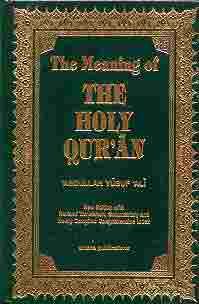
Concerning what are they disputing?
Concerning the Great News. [5889]
About which they cannot agree.
Verily, they shall soon (come to) know!
Verily, verily they shall soon (come to) know!
surah 78:1-5 Al Naba' (The Great News)
"5889. Great News: usually understood to mean the News or Message of the Resurrection.”
Abdullah Yusuf Ali, The Holy Qur'n, Amana Corporation, 1989.
